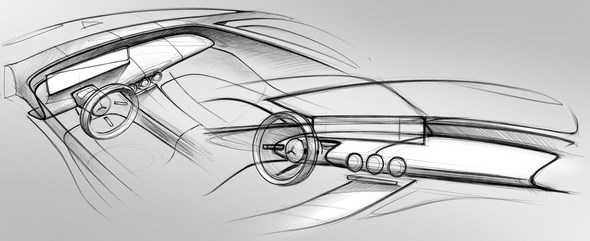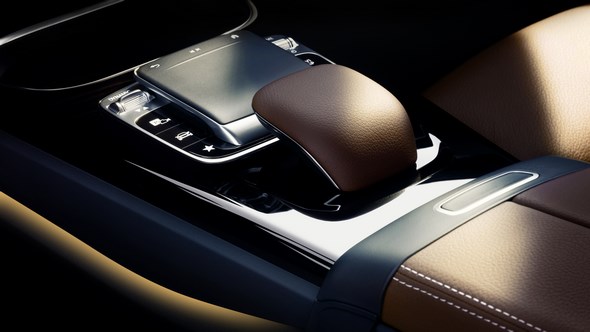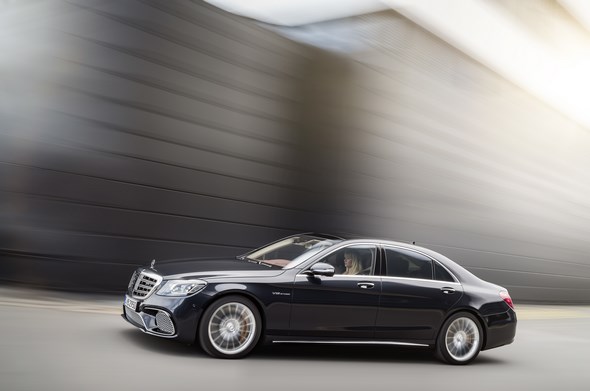The new A-Class: TecDay Interior Design
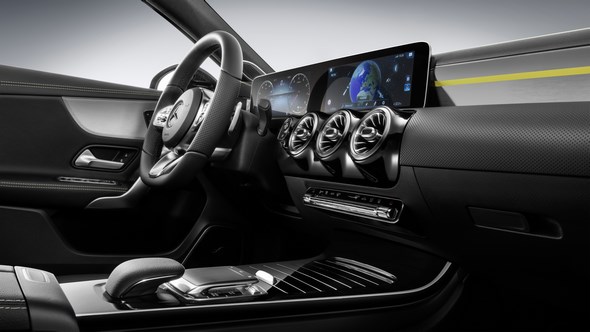
Modern luxury redefined

Stuttgart. The interior of the A-Class is a completely new departure, and revolutionises the compact class from the inside with a new feeling of spaciousness. The unique architecture is particularly marked by the avantgarde design of the dashboard. There is much a more generous amount of interior space.
In the coming year, the new A-Class as a harbinger of the new compact car generation will replace a bestseller that has decisively contributed to a more youthful brand image for Mercedes-Benz: the average age of European drivers of this most progressive compact class model is now 13 years lower than for the preceding series.
And now the revolution is set to continue: the coming AClass completely redefines Modern Luxury in the interior. At the same time it has considerably more utility value, making it as youthful as ever but as grown-up as never before.
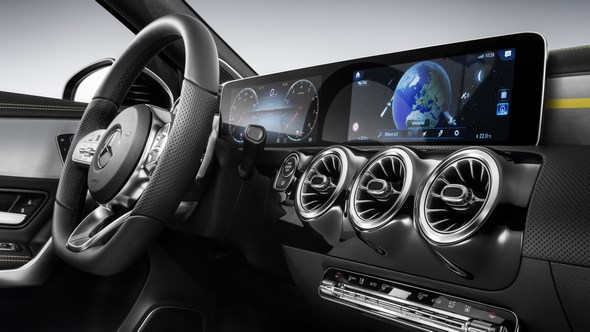
“The new A-Class embodies the next stage in our design philosophy of sensual purity, and has the potential to usher in a new design era,” says Gorden Wagener, Chief Design Officer Daimler AG. “The interior presents modern luxury at a level previously unattainable in this class, and transports the user interface into the digital age.”
The interior architecture and the control & display systems of the new A-Class are a USP in this segment. The dashboard is divided into two three-dimensional, horizontal sections: the lower section is visually separated from the main body of the dashboard by a “trench”, and it appears to float in front of the dashboard. The optional ambience lighting enhances this effect, accentuating the free-floating impression of the substructure.
The standard widescreen cockpit is completely free-standing, and for the first time there are absolutely no cowls above the instruments. The sporty air vents in a turbine-look are another highlight.
The A-Class also takes its lead from the luxury Mercedes-Benz models where many other details are concerned. The multifunctional steering wheel comes from the S-Class, for example.
The front seats likewise have comfort features available from higher segments, including seat climate control, massage function and multicontour seat. The trim elements are in a “wrap-around” design, and the choice of materials (e.g. open-pore wood) underscores the progressive, high-quality positioning.
The interior has a greatly enhanced feeling of spaciousness, better all-round visibility and more space. Utility value is increased by more shoulder-room (front +9 mm, rear +22 mm), elbow-room (front +35 mm, rear +36 mm) and headroom (front +7 mm, rear +8 mm). Easier access to the rear seats is another plus point of the new A-Class.
The luggage compartment behind the rear seats is more suitable for family and recreational use, and has a capacity of 370 litres – 29 litres more than the preceding model.
Thanks to two-section rear lights, the loading aperture is 20 cm wider than before, and the luggage compartment floor is 11.5 cm longer. If required the rear seat backrest can be positioned more upright, e.g. to accommodate bulky boxes. All-round visibility has also been considerably improved: by around ten percent
Interior and seats
Interior revolution
The interior of the A-Class is a completely new departure, and revolutionises the compact class from the inside with a new feeling of spaciousness. The unique architecture is particularly marked by the avantgarde design of the dashboard.
For the first time a cowl above the cockpit has been completely dispensed with. As a result, the wing-shaped main body of the dashboard extends from one front door to the other with no visual discontinuity.
The standard widescreen cockpit is completely free-standing. The sporty air vents in a turbine-look are another highlight. The front seats have comfort features available from higher segments, including seat climate control, massage function and multicontour seat.
The interior architecture and the control & display systems of the new A-Class are a USP in this segment. The dashboard is divided into two three-dimensional, horizontal sections: the lower section is visually separated from the main body of the dashboard by a “trench”, and it appears to float in front of the dashboard. The optional ambience lighting enhances this effect, accentuating the free-floating impression of the substructure.
The lower section of the dashboard provides the basis for the turbine-look air vents and the completely free-standing widescreen display. This is available in three versions: with two 7-inch (17.78 cm), one 7 and one 10.25-inch (26 cm) or with two 10.25-inch displays.
For the latter two variants Mercedes-Benz uses bonded glass technology. Integration of the air conditioning display into the central screen also considerably helps to maintain the clear line of the cockpit. The air conditioning is controlled by the horizontal rocker switches of the A/C operating unit or via the corresponding on-screen menu.
Thanks to the omission of a cockpit cowl, the main body of the dashboard with its trim extends from one front door to the other behind the seemingly free-floating widescreen. The trim elements are in a “wrap-around” design, and the choice of materials (e.g. open-pore wood) underlines the progressive, modern positioning as the top interior in this class.
The five round air vents have a new turbine look inspired by the world of aviation. Finely designed air vanes in a concentric arrangement create the impression of a jet aircraft turbine. In one equipment line the vent surround is colour-accentuated at the depth of the vent geometry, giving the impression of an afterburner. The air vents in the middle are driver-oriented, accentuating the sportiness of the interior.
The door centre panel transitions seamlessly into the armrest, underlining the sensual, flowing design principle. The newly designed 3spoke steering wheel, door handles, centre console and seats follow a modern design idiom. The ring-shaped, completely closed grab/door-pull handle is of unusual design and particularly ergonomic.
Ambience lighting: avantgarde light pattern
From 12 to 64 – with the generation change, five times as many colours are available for the ambience lighting of the new AClass. And it is not just the variety that has increased, as the emotive presentation also sets standards in this segment: the different colours are composed into ten colour worlds allow an avantgarde lighting display with spectacular colour changes.
The colour worlds can be matched to the different styles of the widescreen display if required, creating a harmonious overall impression. There are also lighting effects that customers can activate individually.
The avantgarde ambience lighting was already taken into consideration in an early development phase, and systematically integrated into the interior design.
This is apparent e.g. in the area where the upper and lower sections of the dashboard come together. Thanks to a combination of indirect and direct lighting, a very special ambience is created here which might be compared to the night-time illumination of a historic building.
The interior of the turbine-like air vents with galvanised surfaces is likewise emotively presented by the ambience lighting.
The interior lighting uses only long-lasting, energy-saving LED technology.
Seats: comfort features from higher vehicle classes
When developing the seats for the A-Class, Mercedes-Benz used computer-based comfort simulation for the first time in the compact segment. Before the first real seat is actually available, this allows reliable prognoses to be made about the future comfort impression of the seating system solely on the basis of CAD data.
At the same time, comfort features from higher vehicle segments made an appearance: on request, and for the first time in this model series, not only seat heating but also seat climate control and a Multicontour Seat package are available for the front seats.
With the seat climate control, there is a radial fan in each seat cushion. The air taken in through the perforated seat cover flows through the seat structure and is vented downwards and to the rear. This surrounds the occupants with a pleasant flow of air.
Even when the interior has been strongly heated up in hot weather, the seat climate control rapidly cools the seat surfaces by taking in cooler ambient air. The ventilation level is adjustable in three stages.
With the Multicontour Seat package, the side bolsters and lumbar support can be individually adjusted by an electrically driven pneumatic pump. A massage effect in the lumbar area is provided by air chambers which are inflated and deflated in a pulsing or wave-like motion when the function is activated.
A total of three different front seats are available for the new A-Class: in addition to the basic model there is the comfort seat with up to 20 adjustments and the sporty integral seat available in combination with equipment lines.
The rear seats have a 60/40 split as standard, and the backrests can be folded down accordingly. A rear seat backrest with a 40/20/40 split is also available for even more variability in conjunction with the lines. In combination with the Load Compartment package (optional), the rear seat backrest can be positioned more upright, e.g. to accommodate bulky boxes.
Short interview
“Major step towards the avantgarde”
Three questions for Hartmut Sinkwitz, Head of Interior Design. The 51 year-old studied industrial design and joined Mercedes-Benz in 1995.
Mr Sinkwitz, with its very progressive exterior design, the previous generation of the A-Class decisively contributed to making the Mercedes-Benz brand more youthful. Is the radically new interior design of the new A-Class now intended to create a corresponding “wow” effect amongst the young target group?
Sinkwitz: Well, you haven’t seen the exterior design yet (laughs), and here too, we are immediately conveying sportiness and modernity with a puristic, surface-accentuated design with reduced lines and joints. But you are right: The interior of the new A-Class is a major step towards the avantgarde, and unique especially with respect to the open space architecture and the ultra-modern display and control concept. It lends a new quality to the term “modern luxury” in the compact segment, and is an inner revolution.
The dashboard layout is a special feature of the cockpit…
Sinkwitz: …yes, that’s correct. Thanks to the visual separation of the lower section from the main body of the dashboard, the former appears to float in front of the dashboard. At the same time, the A-Class is the first series-production model to dispense completely with a classic cockpit shroud. This literally places the large widescreen cockpit with its bonded glass technology in the forefront. Moreover, there is no longer a display in the A/C control panel, as the visual representation is exclusively via the central display. This helped us to realise our clean, puristic and reduced design approach.
What is your personal highlight in the interior?
Sinkwitz: In view of the wealth of inspired design solutions, that is not so easy to say. But I am proud of the ambience lighting, a unique feature in this segment, which creates a very special lighting mood with its variety of colours, colour worlds and a combination of direct and indirect lighting. This only became possible to this extent because we considered the interior lighting before even putting pen to paper.
Luggage compartment and all-round visibility
Fully grown-up
Even though Mercedes-Benz has retained a sporty look for the new A-Class, the utility value has increased: more shoulder, elbow and headroom plus easier access to the rear are clear benefits, as is the larger and more family and recreation-friendly luggage compartment. All-round visibility has also been considerably improved. This enhances both safety and the impression of spaciousness.
The capacity of the luggage compartment behind the rear seats is 370 litres – 29 litres more than in the preceding model. Thanks to two-section rear lights, the loading aperture is 20 cm wider than before, and the luggage compartment floor is 11.5 cm longer. But the progress is not only obvious on paper: the developers of the new A-Class attached particular importance to utility and loading convenience, and virtually tested the luggage compartment with an extensive shopping basket during an early conceptual phase.
The list of shopping basket contents covered over 70 different items. Loading was simulated using the CAD data of the vehicle and items, and where necessary the design of the luggage compartment was fine-tuned. The result is that not only can a pushchair be accommodated in the boot of the A-Class, but also a bicycle if its wheels are separately stowed. Two additional crates of drinks can be stowed compared with the preceding model. A golf bag can also be carried, or two if the luggage cover is removed. If required, the rear seat backrest can be positioned more upright, e.g. to accommodate bulky boxes.
The stowage concept is equally practical: the oddments tray in the centre console ahead of the shift or DCT lever has been significantly enlarged to accommodate items such as a smartphone, wallet, keys or a garage door opener. A cup holder on the centre tunnel for mugs, cans and bottles up to 0.5 litres is a new standard feature. The cup holder insert is removable, making a further stowage space available. The owner’s manual is smaller in size, and is accommodated in a separate flap in the glove compartment.
The stowage facilities in the door panels have significantly increased in size, however. 1.5-litre PET bottles or A4-sized magazines can now be stowed in the front door pockets. The rear door panels have bottle holders for 1-litre PET bottles. A new feature in all four door panels is the integrated accommodation of safety vests, which are therefore quickly to hand when needed.
Better all-round visibility for added safety and comfort
Much detailed effort has also gone into the improved all-round visibility. The risk of overlooking vehicles or pedestrians when turning off, changing lane or parking has been significantly reduced.
All in all, the obscured area has been reduced by 10 percent compared to the preceding model. This was principally achieved by specifically slimming down the A, B and C-pillars and their claddings. Improved visibility is also assured by positioning the exterior mirrors on the door outer panel rather than in the mirror triangle.
A good view to the rear is ensured by the new rear window wiper. For a larger wiped area, the housing of the roof spoiler has an inner recess to create space for the longer wiper blade.
More space: increased comfort-related dimensions
Not only has the sense of spaciousness been improved, but the occupants also have significantly more width available, as the table shows:
Key interior dimensions in mm A-Class (old) A-Class (new) Difference
Elbow room, front 1422 1457 +35
Elbow room, 2nd seat row 1410 1446 +36
Shoulder room, 1st seat row 1391 1400 +9
Shoulder room, 2nd seat row 1350 1372 +22
Maximum headroom, front 1017 1024 +7
Maximum headroom, rear 952 960 +8
Interesting aspects of the A-Class
Did you know that…
…the success story of the compact cars from Mercedes-Benz already began 20 years ago, with the launch of the first A-Class? More than 5,555,555 Mercedes-Benz compact cars have been delivered worldwide since March 1997 – of which three million alone were A-Class models.
…the introduction of the new A-Class in 2012 significantly contributed to a more youthful Mercedes-Benz brand image? In Europe the average age of drivers owning a new A-Class is more than 13 years less than for drivers of the preceding model series. In China one in three customers were under the age of 30 in 2016.
…the A-Class has a particularly high capture rate? In western Europe in 2016, 70 percent of A-Class drivers did not previously drive a MercedesBenz.
…the compact car segment around the A-Class is being expanded further? At present the compact car family consists of 5 models: A-Class, B-Class, CLA, CLA Shooting Brake, GLA. There will be 8 models in the future. The Concept A Sedan show car provides an outlook on the next compact car generation, and the Concept EQA shows how the EQ family can be extended to the compact segment.
…in early 2012, disguised prototypes of the A-Class drove through Germany with a full covering of QR code decals rather than with the usual camouflage? During this “QR Trophy”, car enthusiasts were able to scan the codes and win a trip to the world premiere of the A-Class at the Geneva Motor Show.
…the last A-Class generation has won numerous design awards? These include the “red dot Design Award 2013”, the “Design Trophy 2013” (Auto Zeitung) and the “AUTO BILD Design Award 2012”.
…since summer 2016, car2go customers can also drive the
Mercedes-Benz A-Class as well as smart models? car2go first expanded its fleet in Berlin with the compact model, followed by the Rhineland, Munich and Hamburg.
…the A-Class was voted the vehicle with the highest value retention in its class by “Focus Online” and “Bähr & Fess Forecast” in 2012? With the highest percentage value retention (55.5 percent) in its segment as a four-year old used car, the A-Class was a “2016 value retention champion”.
…the last A-Class generation was the first Mercedes-Benz model to be available with comprehensive smartphone integration? From the beginning of 2016 the infotainment systems Apple® CarPlay® (for iPhone® owners) and MirrorLink® became available.

